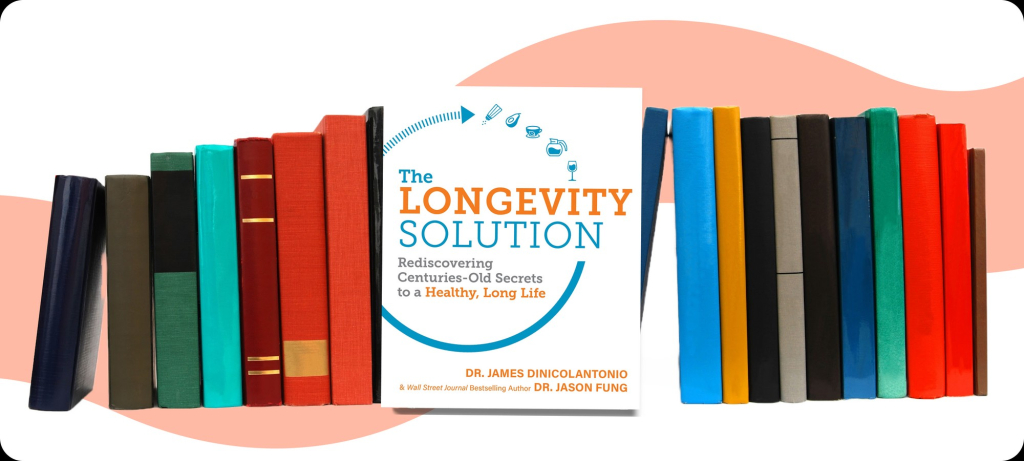Believe it or not, children today may face shorter lifespans than their parents, a change from the steady improvements in average life expectancy seen in the past century due to chronic diseases. Earlier, infectious diseases caused deaths, mainly affecting children and the elderly. Now, cardiovascular disease and cancer are the leading causes of death, particularly as people age.
These ageing-related diseases, such as cataracts, osteoporosis, and type 2 diabetes, account for most daily deaths globally, especially in the industrialised West. As infectious diseases wane, the focus shifts to combating chronic diseases, worsened by the obesity epidemic. Lifestyle changes can mitigate risks, promoting ‘health span’ – more disease-free years. In this context, ‘The Longevity Solution’ by Dr. James DiNicolantonio and Dr. Jason Fung shines a light on nutrition choices that can lead to longer and healthier life.
About the authors

James DiNicolantonio is a cardiovascular research scientist and doctor of pharmacy at Saint Luke’s Mid America Heart Institute in Kansas City, Missouri.

He is also the accomplished author of ‘The Salt Fix’ and ‘Superfuel.’ Widely recognised and respected on a global scale, Dr. DiNicolantonio is a prominent figure in the realm of health and nutrition. His influence extends to health policy, including his compelling testimony before the Canadian Senate on the detrimental effects of added sugars.
Dr. DiNicolantonio is actively engaged as the Associate Editor of Nutrition and holds a significant role in the publication of ‘Open Heart,’ a journal established in collaboration with the British Cardiovascular Society and the British Medical Journal (BMJ). His scholarly impact encompasses around 200 published works within the medical literature, and he contributes his insights as a member of various medical journal editorial advisory boards.
Jason Fung, a well-known medical doctor, nephrologist, and author, has made significant contributions to the fields of obesity, diabetes, and cancer.

He is the author of influential books such as ‘The Obesity Code’, ‘The Diabetes Code’, and ‘The Cancer Code’.
With his expertise in obesity and diabetes, Fung emphasises addressing the root causes of these diseases rather than merely managing symptoms. He has been a vocal critic of conventional treatments for type 2 diabetes, arguing that they are both ineffective and detrimental to patients.
What is the book about?

‘The Longevity Solution’ is a comprehensive exploration of the factors influencing human longevity and overall well-being.
The book delves into a range of topics including diet, nutrition, and lifestyle choices that have the potential to extend lifespan. It offers insights into the benefits of practices such as intermittent fasting, discussing how these approaches can positively impact cellular health and ageing.
Additionally, the authors emphasise the significance of metabolic health, debunking myths and misconceptions while providing evidence-based advice rooted in scientific research. With a focus on practical tips, the book equips readers with actionable strategies to integrate longevity-promoting principles into their daily lives.
Key takeaways from ‘The Longevity Solution’

1Adopt a low-carb diet
The book emphasises the benefits of a low-carbohydrate diet for promoting longevity and metabolic health. Readers are encouraged to reduce their intake of refined carbohydrates and sugars while focusing on whole, nutrient-dense foods.
2Consider moderate protein intake
Excessive protein, beyond what’s necessary for maintaining structures like muscle, can be metabolised for energy or stored as glycogen/fat. Similar to excess carbs, this surplus protein might contribute to metabolic issues like obesity and type 2 diabetes. A low-carb diet could address such problems by prioritising fat for energy, and similarly, low-protein diets might offer benefits.
The appropriate protein intake varies based on circumstances. Muscle building, pregnancy, breastfeeding, and childhood growth necessitate higher protein consumption. Conversely, weight loss goals might require less protein than the estimated 0.61 grams per kilogram per day.
3Intermittent fasting is a potential longevity booster
Intermittent fasting is highlighted as a strategy to improve healthspan and longevity. Readers are encouraged to explore different fasting approaches and find a pattern that suits their lifestyle, with the potential benefits of enhanced insulin sensitivity and cellular repair.
Prolonged fasting, lasting over 24 hours but less than biweekly (unless medically monitored), offers anti-ageing potential. Yet, infrequent implementation safeguards muscle mass and minerals.
4It’s ok to consume coffee, tea and wine but do this in moderation and avoid added sugar
In North America, coffee’s popularity, evident from the success of chains like Starbucks, is no surprise. Fortunately, coffee brings healthful compounds. Optimal consumption ranges from one to five cups daily, customisable to your taste.
Avoid sugary additions, and opt for organic coffee. Drinking coffee with meals can also reduce iron absorption and mitigate oxidative stress.
Green tea, rich in catechins, is popular in Asia for longevity; black and oolong teas hold similar benefits.
Research shows red wine’s consistent link to longevity, likely due to polyphenols like quercetin and resveratrol. Moderation is key (two drinks for men, one for women) with the largest meal.
5Engage in regular physical activity
Physical activity is a cornerstone of a long and healthy life. The book recommends incorporating both aerobic and strength-training exercises into one’s routine.
6Optimise salt and magnesium intake
Naturally, your body requires roughly 4 grams of sodium (2 teaspoons) daily for essential functions. Restricting salt leads to issues like insulin resistance, kidney problems, and muscle spasms.
For magnesium, choose wisely; magnesium oxide is cheap but poorly absorbed. Opt for magnesium diglycinate, citrate, or chloride (balanced with bicarbonate). Most lack optimal magnesium intake. Consider around 300 milligrams daily, from mineral waters or quality supplements.
7Eat more natural, healthy fats
Prioritise healthy fats from wild seafood like salmon, sardines, and shrimp – half your animal protein intake. This ensures optimal long-chain omega-3s and astaxanthin antioxidants. If unavailable or unappealing, consider krill, algal, or fish oil supplements for brain protection.
Limit wild seafood due to pollutants; twice weekly is suitable. Supplement with krill and fish oil on other days for clean omega-3s.
Avoid industrial trans fats and seed oils, common in packaged foods. Opt for pastured eggs, grass-fed dairy, cheese, and meats. Use pastured butter or organic coconut milk for healthier cooking. Limit cow’s milk due to oxidised cholesterol; consider moderate amounts or opt for organic coconut milk.
Table of contents

- Preface
- Chapter 1: Aging: Nature Doesn’t Care How Long We Live
- Chapter 2: Calorie Restriction: A Double-edged Sword
- Chapter 3: Mtor And Longevity
- Chapter 4: Dietary Protein
- Chapter 5: Plant Versus Animal Protein
- Chapter 6: The Optimal Amount Of Protein
- Chapter 7: Fasting
- Chapter 8: Tea
- Chapter 9: Red Wine And Coffee
- Chapter 10: Eat More Salt And Magnesium
- Chapter 11: Healthy And Unhealthy Fats
- Chapter 12: The Blue Zones: The Longest-living Cultures
- Chapter 13: Full Plan For Healthy Aging
- Epilogue
- Endnotes
Strengths and weaknesses, according to readers’ reviews

Strengths
-
The writing style is easy to read.
-
Contains useful information on a healthy diet for someone not familiar with recent nutrition science.
-
Gives article citations and explains the science in layman’s terms.
Weaknesses
-
Many readers didn’t like the advertisements inserted into the book and found them distasteful.
-
Contains repetitive content.
Best quotes from ‘The Longevity Solution’

“Although lack of physical activity and smoking are important risk factors for heart disease, aging is by far the biggest risk factor. It’s pretty obvious when you think about it. Plenty of teenagers smoke and don’t exercise, but they virtually never have heart attacks. On the other hand, there are plenty of 75 year-old people who don’t smoke and do their exercise and still have heart attacks.”
“Protein restriction plays a large role in extending life span by slowing growth (and aging). Manipulation of dietary protein is potentially easier than restricting calories or fasting, but it has similar benefits.”
“Customizing our diets — specifically our protein intake — could stave off disease and promote longer life. The key to longevity might already be in your hands. It’s not a magical berry from a far-off land. It’s not even a stringent low-calorie diet. It starts with simply optimizing your protein intake.”
Final takeaway

‘The Longevity Solution’ by Dr. James DiNicolantonio and Dr. Jason Fung addresses the questions of average life expectancy and how nutrition affects it. The book highlights the importance of adopting a low-carb diet, considering moderate protein intake, exploring intermittent fasting, engaging in regular physical activity, optimising salt and magnesium intake, and consuming healthy fats. While some readers pointed out at the book’s weaknesses, such as product placement, others said that the book offers practical insights for promoting longevity and health.
Where to buy
You can buy ‘The Longevity Solution: Rediscovering Centuries-Old Secrets to a Healthy, Long Life’ on Amazon, where it’s available in paperback, Kindle and audio formats.








